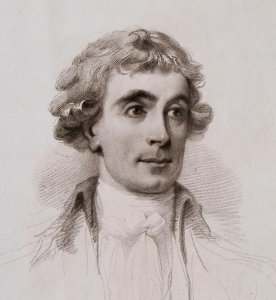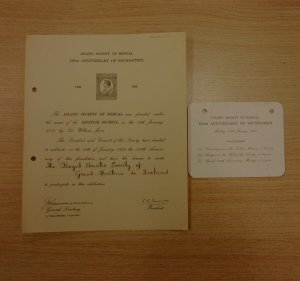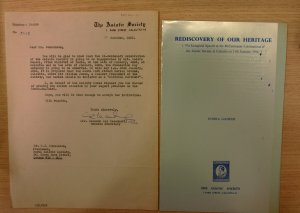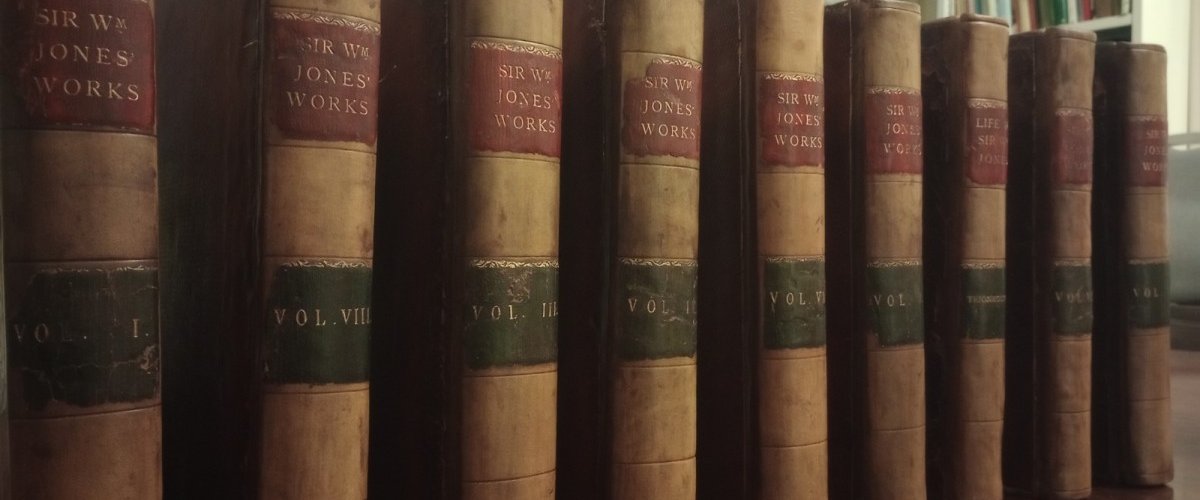The Asiatic Society and William Jones
This week, on 15 January, the Asiatic Society, Kolkata, celebrated the anniversary of its founding. The Royal Asiatic Society of Great Britain and Ireland would like to send their congratulations to the Asiatic Society on reaching 241 years since its establishment in 1784. The Society was founded by the philologist William Jones in a meeting presided over by Justice Robert Chambers. Jones sent out a letter to a number of residents to invite them to establish a society for Asiatic Studies. Thirty men met in the Grand Jury Room of the Supreme Court for that first meeting. As the Society grew, it wanted its own building and in 1796, J.H. Harrington, then vice-president, selected the corner of Park Street and Chowringhee Road for the Society’s house. The site was granted to the Society on 15 May 1805 and the first quarterly meeting of the Society for 1808 was held at its new building. The Society still remains at this site.

As Dr Gordon Johnson discussed in a previous blog post, William Jones was “one of the greatest linguistic prodigies of the eighteenth-century, thoroughly fluent in English, Welsh, Greek, Latin, Persian, Arabic, Hebrew, and Sanskrit… [T]hrough the influence of his patron, the Earl Spencer (Jones had been tutor to his son), [he was] appointed in 1783 to the lucrative office of a judge on the Supreme Court of Judicature at the East India Company’s settlement, Fort William, in Kolkata… Explaining the origins of the Asiatic Society, Sir William Jones wrote:
“‘When I was at sea last August, on my voyage to this country, which I had long and ardently desired to visit, I found one evening, on inspecting the observations of the day, that India lay before us, and Persia on our left, whilst a breeze from Arabia blew nearly on our stern. A situation so pleasing in itself, and to me so new, could not fail to awaken a train of reflections in a mind, which had early been accustomed to contemplate with delight the eventful histories and agreeable fictions of this eastern world. It gave me inexpressible pleasure to find myself in the midst of so noble an amphitheatre, almost encircled by the vast regions of Asia, which has ever been esteemed the nurse of sciences, the inventress of delightful and useful arts, the scene of glorious actions, fertile in the productions of human genius, abounding in natural wonders, and infinitely diversified in the forms of religion and government, in the laws, manners, customs, and languages, as well as in the features and complexions of men. I could not help remarking, how important and extensive a field was yet unexplored, and how many solid advantages unimproved; and when I considered, with pain, that, in this fluctuating, imperfect, and limited condition of life, such inquiries and improvements could only be made by the united efforts of many, who are not easily brought, without some pressing inducement or strong impulse, to converge in a common point, I consoled myself with a hope, founded on opinions which it might have the appearance of flattery to mention, that, if an any country or community, such a union could be effected, then it was among my countrymen of Bengal, with some of whom I already had, and with most was desirous of having, the pleasure of being intimately acquainted.’
“Jones’s enthusiasm for finding out about other people’s languages, literature, religion, arts and society was driven in part by the Enlightenment’s thirst for pure knowledge and the expectation that discovering such would lead, rationally, to improvement in the lot of human existence. It was allied to different Romantic ideals (strong in Jones as a Welshman) that sought to explore the emotions and to bring together universal human experiences: all would benefit about knowing each other. Jones’s Asiatic Society in Kolkata was to make a distinctive contribution to the furtherance of knowledge and understanding about Asia, and much was brought to a wider public for information and criticism through its meetings and publications.”
And, of course, the Royal Asiatic Society of Great Britain and Ireland owes a debt of gratitude to the Asiatic Society. Henry Thomas Colebrooke, who succeeded William Jones as President of the Asiatic Society, was so dedicated to enabling Asian studies that, on his return to England, he founded this Society in 1823. The Asiatic Society in Kolkata has continued its strong tradition of research and publications. Throughout its long history, it has also taken time to celebrate and commemorate its beginnings. Within our archives we have papers recording some of these events and some of the correspondence that has occurred between the two Societies.
In 1934, the Asiatic Society celebrated its 150th Anniversary. Babu Ganapati Sircar and Professor A.H. Harley represented the Royal Asiatic Society at the celebrations. The photograph below shows the invitation letter and card sent to the Royal Asiatic Society.

The 190th anniversary coincided with the 150th birth anniversary of Raja Rajendra Lal Mitra, the polymath scholar and the first Indian president of the Asiatic Society. Though the Royal Asiatic Society were unable to attend they still sent official greetings and congratulations.

The Asiatic Society’s bicentenary came in 1984 with celebrations both in India and Britain. The Indian celebrations included a visit to the Society by the then Prime Minister, Indira Gandhi. In Britain, celebrations included an exhibition at the British Library entitled ‘Sir William Jones and the Asiatic Society of Bengal’ which ran from January to April 1984.

The pictures above just show a few of the archives we hold. We also hold many of the Asiatic Society’s publications including copies of its Journal, first published as Asiatick Researches in 1788. We also have some collections pertaining to Sir William and Lady Anna Maria Jones including artworks of natural history drawn or commissioned by them. Jones was a prolific researcher and his collected works, published posthumously, brought together much of his learning. Among our collections are a first edition of these collected works, in eight quarto volumes, (feature image) which was kindly donated by Michael Loewe in 2023 in celebration of his 100th birthday and the Society’s bicentenary and whose death we sadly announced in last week’s blog post.
Nancy Charley, 17 January 2025.

